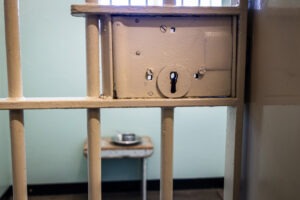Without question, immigrants and refugees in the United States have been hard hit since September 11. Almost immediately after planes crashed into the World Trade Center and the Pentagon, a wave of violence began to sweep the country, targeting immigrants as victims of “retaliation.” Federal policies have reinforced a hostile atmosphere, portraying immigrants as threats to national security and contributing to a marked increase in discrimination and harassment of immigrants.
Complicating the difficult task of organizing around issues such as domestic violence, workers’ rights, legalization, and abusive law enforcement, these new “anti-terrorism” policies have forced immigrants into a more vulnerable position than before. Immigrant community organizers recognize that while today’s anti-immigrant sentiment is nothing new, the level and the specificity of attacks have made it more challenging to organize.
“What’s really interesting is what hasn’t changed,” observes Hatem Abudayyeh, director of the Arab American Action Network (AAAN) of Chicago, IL. “It’s not as if there wasn’t anti-Arab racism prior to September 11 or that life was wonderful… there were still major issues with the INS [Immigration and Naturalization Service] and the Department of Justice prior to the attacks. Now they’re much more obvious, and now because of the climate as a whole in the U.S. many are not speaking out about those injustices any longer.”
Thanks to the overwhelming success of fundraising drives following the disaster, many families of victims have received financial assistance for the difficult task of rebuilding their lives. For the loved ones of immigrants who died in the World Trade Center, however, accessing compensation has proved to be much more challenging. Since many of the immigrant victims of the World Trade Center were undocumented workers making less than minimum wage, employers have been less willing to disclose their names for fear of legal reprisal. Grieving families have found it difficult to receive aid due to the presence of immigration and law enforcement personnel at aid stations. A lack of translation services provided another barrier to access. The economic aftershocks of the attacks have also devastated local immigrant communities, as thousands of workers have lost their livelihoods.
Asociación Tepeyac, a coalition of forty Mexican organizations in New York, established an emergency response system in the aftermath of September 11. In the days after the attack, Tepeyac began to collect names of those missing through networks of friends, relatives, and co-workers. They have contacted victims’ families outside the United States and have helped family members access benefits. They continue to collect and dispense relief money to those who remain jobless due to the attacks. Yet, as immigrant families do not have the same access to financial safety nets such as unemployment, welfare, or union protection, the task remains difficult.
“Anti-Terrorism’s” Frontline
Harassment, intimidation, and violence by civilians and law enforcement officials have become a routine of daily life for Arab, Muslim, and South Asian communities. A recent report released by South Asian American Leaders of Tomorrow documented over 645 hate incidents against Arabs, South Asians, Muslims, and Sikhs within the first two weeks after the September 11 attack. These dramatic numbers provide only a hint of the harassment and intimidation that communities continue to encounter.
The attorney general’s official “anti-terrorist” actions have led to increased visibility and targeting for long-standing local community institutions, nonprofits, and religious centers. In Chicago, where the offices of the Arab American Action Network were burned after September 11, local community members have organized a mosque defense network to spread a message of peace and unity across race, national, and religious lines. On Friday afternoons (the most important prayer day of the week), community members surround mosques with signs of support in Spanish, English, and Arabic.
“We had older white Christian women standing side by side with young Muslim brothers and sisters, with Latinos and African Americans. There were secular and religious people,” noted Hatem Abudayyeh. “It really was a broad spectrum of people who care about justice, people who care about fellowship in their communities.” By working in broad coalitions with other community-based groups during the past few months, AAAN is breaking through a climate of fear.
The secret detention and denial of legal counsel to more than 1,200 South Asian, Arab and Muslim individuals by the FBI, CIA, and INS is also fueling fear in immigrant communities. This secrecy has led several advocacy groups to sue for the release of the identities of the detainees. A coalition of groups in New York and New Jersey, including New York City’s Desis Rising Up and Moving (DRUM), are also working directly with family and community members to argue for the just treatment of detainees and their release from local jails and INS facilities. As DRUM community organizer Subhash Kateel notes, “The community suffered after the World Trade Center attacks by losing several lives and also from the economic impact of losing jobs, then from a war in the region of the world that we call home, and now, attacks by the INS and the general public. It’s been a triple effect.”
DRUM and other coalition members have set up hotlines to report incidents of hate violence and law enforcement harassment, organized family and community members of the detainees, and visited detainees in INS facilities. On Martin Luther King Day, DRUM staged the first large-scale protest in front of local INS detention centers, reading statements written by detainees about abuse by the Department of Justice, INS officials, and prison guards.
As international and national press focused on the protest highlighting the mistreatment of detainees, INS leaders recently agreed to hold a public forum about the detentions. Breaking through the atmosphere of fear and silence, Kateel notes, has been critical to the success of organizing. INS and FBI abuse, ironically, has been instrumental in moving people to action. “In a lot of ways, these laws were made to silence our communities… but peoples’ resolve and their willingness to speak out has grown as the INS and FBI have become more abusive and secretive,” Kateel said.
Sign up for our free newsletters
Subscribe to NPQ's newsletters to have our top stories delivered directly to your inbox.
By signing up, you agree to our privacy policy and terms of use, and to receive messages from NPQ and our partners.
Organizing for immigrant rights has also become more difficult as the recession and economic fallout from September 11 resulted in the lay-off of thousands of immigrants employed in the lower tiers of the tourism and service industries. Immigrant workers outside these sectors, however, have also seen their jobs disappear as employers tighten their own belts and become more reluctant to hire informal labor.
“Every day, we see more and more day laborers and domestic workers out of jobs,” observed Mayron Payes, the workers’ rights coordinator at the Coalition for Humane Immigrant Rights of Los Angeles (CHIRLA). Because immigrants often do not have the same access to financial safety nets such as unemployment, welfare, or union protection, the impact of losing employment is even greater for their families.
Yet the fear of losing jobs has increased as the Bush Administration continues to enact new policies against immigrants in the “war against terrorism.” Last November, the Aviation and Transportation Security Act mandated the replacement of over 28,000 immigrant airport screeners—about 25 percent of all screeners nationwide—with U.S. citizens (slated to earn much higher wages). For workers who have endured low pay, tedious working conditions, and few if any benefits for years, these measures clearly discriminate against immigrants.
“A worker’s performance has less to do with their citizenship than low wages and difficult labor conditions,” said Lillian Galedo of Filipinos for Affirmative Action, in Oakland, CA. “This has become an important issue to the Filipino community because it represents the scapegoating of non-citizen immigrants.”
Working in coalition with Service Employees’ International Union (SEIU) local 790 and the Phillip Veracruz Justice Project, Galedo’s group has been organizing screeners at Oakland and San Francisco airports to challenge the policy, stage rallies and press conferences, and to assess the impact on the community of losing such a significant number of jobs. Workers have begun to hold weekly meetings and educational forums on the issue, serving as a model for other airports around the country. These workers have also joined the ACLU and SEIU in a lawsuit challenging the constitutional validity of this discriminatory legislation. They hope to prevent immigrants from losing the fundamental right to work, no matter their citizenship status.
In the midst of a period characterized by anti-immigrant legislation, organizers across the country have successfully lobbied their local city governments to continue supporting immigrant rights. In Los Angeles, for example, a network of local immigrant rights organizations persuaded the city council to unanimously pass the “Immigrant Rights Resolution.” The Multi-Ethnic Immigrant Worker Organizers’ Network (MIWON) had planned to push through the resolution before September 11, but organizers hesitated as the political climate grew unfriendly to immigrants. With the endorsement of over 80 community organizations, unions, and churches, however, and the support of friendly council representatives, the resolution was passed on December 18, International Migrant Rights Day.
“Especially after September 11, we needed to send a message that immigrants make an important contribution to society, and that the U.S. is not the only place where immigrants live and face these struggles,” said Mayron Payes of CHIRLA. A resounding symbolic victory, the city’s resolution reaffirmed the right of immigrants to fair working conditions, legalization, and democratic rights.
Community organizers in Portland, Oregon, have also built on previous coalition work to push for the protection of immigrants’ civil liberties in their city. Before September 11, a broad front of local religious, labor, immigrants, and community groups mobilized successfully against local law enforcement abuse and anti-immigrant legislation. After September 11, these groups made a conscious decision that their work needed to continue. By December, the Portland police department made headlines when it announced that it would not cooperate with the attorney general’s instructions to “interview” a list of over 5,000 Arab, Muslim, and South Asian men. They cited the lack of evidence beyond race, national origin, or immigration status to suggest any ties to “terrorist” groups. This victory, suggests Liz Perry of VOZ, a local day laborer’s organization, was due in part to overwhelming pressure from community groups. “There was a tremendous response from the community… the city council chambers were filled to standing room only. Group after group testified that it was important for them to feel safe in the community, without fear,” said Perry.
Today’s heightened climate of xenophobia means that immigrant communities face greater challenges in working for change. The “war against terrorism” has targeted immigrants—particularly non-citizens and the undocumented—as the “enemy” and pitted them against those who enjoy the benefits of American citizenship.
All people of color and low-income communities share interests in issues such as hate violence, racial profiling, access to public benefits, and rights for those who are detained and imprisoned. In this time of crisis, it’s critical for a broad range of groups to build alliances and support the rights of immigrants and refugees. Racism and intolerance against any group, even in times of political difficulty, ultimately undermines all communities’ work to secure civil and human rights.
While your organization may not typically interact with immigrants, that should not deter your support and alliance. The examples above show that non-immigrant organizations can successfully support the work happening within immigrant communities. Together, we can all work to defeat fear.
Eunice Hyunhye Cho is a project associate at the National Network for Immigrant and Refugee Rights (www.nnirr.org).










